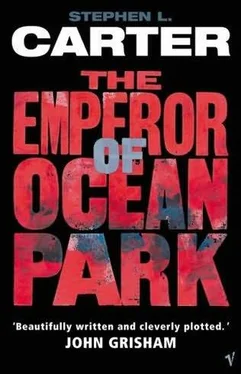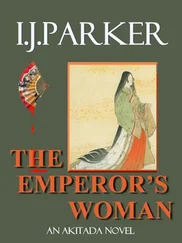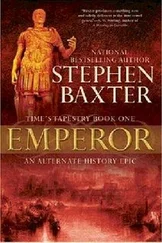Stephen Carter - Emperor of Ocean Park
Здесь есть возможность читать онлайн «Stephen Carter - Emperor of Ocean Park» весь текст электронной книги совершенно бесплатно (целиком полную версию без сокращений). В некоторых случаях можно слушать аудио, скачать через торрент в формате fb2 и присутствует краткое содержание. Жанр: Криминальный детектив, на английском языке. Описание произведения, (предисловие) а так же отзывы посетителей доступны на портале библиотеки ЛибКат.
- Название:Emperor of Ocean Park
- Автор:
- Жанр:
- Год:неизвестен
- ISBN:нет данных
- Рейтинг книги:3 / 5. Голосов: 1
-
Избранное:Добавить в избранное
- Отзывы:
-
Ваша оценка:
- 60
- 1
- 2
- 3
- 4
- 5
Emperor of Ocean Park: краткое содержание, описание и аннотация
Предлагаем к чтению аннотацию, описание, краткое содержание или предисловие (зависит от того, что написал сам автор книги «Emperor of Ocean Park»). Если вы не нашли необходимую информацию о книге — напишите в комментариях, мы постараемся отыскать её.
Emperor of Ocean Park — читать онлайн бесплатно полную книгу (весь текст) целиком
Ниже представлен текст книги, разбитый по страницам. Система сохранения места последней прочитанной страницы, позволяет с удобством читать онлайн бесплатно книгу «Emperor of Ocean Park», без необходимости каждый раз заново искать на чём Вы остановились. Поставьте закладку, и сможете в любой момент перейти на страницу, на которой закончили чтение.
Интервал:
Закладка:
“That isn’t all,” she goes on in the same flat voice, her eyes on something beyond the room. “I talked to him last night. To Uncle Jack.”
“Last night? He called? Here?” I should be proud of myself, managing to ask three stupid questions where most people could squeeze in only one.
“Yes. And he gave me the creeps.”
Now it is my turn to be set back. Far back. Again, I search for something to say, settling at last on the obvious.
“Okay, so what did he want?”
“He offered his condolences. But mostly he wanted to talk about you.”
“About me? What about me?”
Mariah pauses, and she seems to wrestle with her own instincts. “He said you were the only one Daddy would trust,” she explains at last. “The only one who would know about the arrangements Daddy had made for his death. That was what he kept saying. That he needed to know the arrangements.” The tears are flowing again. “I told him that the funeral was Tuesday, I told him where, but he-he said those weren’t the arrangements he meant. He said he needed to know about the other arrangements. And he said you would probably know. He kept on saying it. Tal, what was he talking about?”
“I don’t have any idea,” I admit. “If he wanted to talk to me, why didn’t he call me?”
“I don’t know.”
“This is too weird.” I remember Just Alma. He had plans for you, Talcott. That’s the way your daddy wanted it. Is this what Alma was talking about? “Just too weird.”
Something in my tone gets a rise out of my sister, as something in my tone often does. “Are you sure you don’t have any idea, Tal? About what Jack Ziegler might have wanted?”
“How would I know?”
“I don’t know how you’d know. That’s what I’m wondering.” As Mariah glares her distrust, I feel, rising between us, the shade of our lifelong argument, Mariah’s sense that I am never there for her, and mine that she is far too demanding. But surely she does not believe that I would somehow be involved with… with somebody like Jack Ziegler…
“Mariah, I’m telling you, I don’t have the slightest idea what this is all about. I don’t even know the last time I heard from… from Jack Ziegler.”
She flips a hand, brushing this away, but makes no verbal response. She is not saying she trusts me; she is signaling a willingness to call a truce.
“So, all he asked about was… arrangements?”
“Pretty much. Oh, and he also said he would probably see us at the funeral.”
“Oh, boy,” I mutter, in an awful stab at sarcasm, wondering if there is some way to keep him out. “We can all look forward to that.”
“He scares me,” says Mariah, her earlier speculations about Uncle Jack evidently off the table for now, although certainly not forgotten. Then she squeezes my fingers. I look down in surprise: we have linked hands, but I cannot remember just when.
“He scares me, too,” I say. Which is, I am pretty sure, the most honest sentence I have uttered all day.
CHAPTER 4
It was the Judge’s occasional hope to die before Richard Nixon, who would then be obliged-so my father reasoned-to attend his funeral, and perhaps even to say a few words. President Nixon, you might say, helped to create my father, discovering him as an unknown trial judge with a moderately conservative bent, inviting him to the White House often, and, at last, appointing him to the United States Court of Appeals, where, a bit over a decade later, Ronald Reagan discovered him all over again, and nearly managed what the newspapers of the moment called a “diversity double” at the Supreme Court: Reagan, struggling against his hard-won image as the savior of the nation’s white males, would appoint the Judge and, at a stroke, double the number of black Justices and, at the same time, become the first President to appoint two Justices who were not white males. Reagan’s grab at history failed, and my father, who like many successful people never quite untangled ambition from principle, refused to forgive him for the sin of giving up on the nomination.
But my father’s attitude toward Nixon was otherwise. The Judge returned Nixon’s favor, still insisting a quarter-century after the only presidential resignation in our history that it was a cabal of vengeful liberals, not Nixon’s own venality, that drove the man from office. The Judge saw in Nixon’s fall remarkable parallels to his own, and loved to point them out to his eager lecture audiences: two enlightened, thoughtful conservatives, one white, one black, each of whom, on the verge of making history, had his career destroyed by the ruthless forces of the left. Or something like that: I heard that particular stump speech only twice, and it turned my stomach both times-not for ideological reasons or because of its patent distortion of history but because of its gruesome, un-Garland-like bath of self-pity.
Alas, my father did not achieve his dream. It was he who attended Nixon’s funeral, not the other way around. The Judge flew off to California, hoping, on what evidence I can scarcely imagine, for an invitation to eulogize his mentor. If you watched the service on television, you know it did not happen. My father’s face was never even visible. He was squeezed into about the fifteenth row, lost among a smattering of former deputy assistant secretaries of no-longer-extant Cabinet departments, some of them convicted felons. Chafing from yet another disappointment, my father hastened home, wondering, no doubt, who of any note would attend his funeral.
Who, indeed? I ponder my father’s morbid question as, tightly clutching the hand of my beautiful wife, I follow the casket down the nave aisle of the Church of Trinity and St. Michael, a drafty granite monstrosity just below Chevy Chase Circle where, nine years ago this December, to the general astonishment of our families and friends, Kimmer and I were married. Most, I might add, are even more astonished that we are married still, for our tumultuous mutuality has been marked by many false beginnings.
Who, indeed? We children are following the casket. Addison, whose creaky eulogy a few minutes ago displayed all the same saccharine religiosity of his radio call-in show, is flanked, in defiance of etiquette, by his girlfriend of the moment. Mariah is ahead of me, her husband, Howard, adoring at her side, some subset of her children trailing in her wake, the rest of them either back at Shepard Street with the au pair or perhaps wandering the church, climbing somewhere they shouldn’t. Then, remembering that Mariah and her offspring are family, I command my musings away from their unexpectedly spiteful path, for, as I believe I have mentioned, the Judge always counseled his children to avoid unworthy thoughts.
Who, indeed? I wonder, stifling a cough from the choking cloud of incense that is still part of the ritual of traditional Episcopal churches, even if most have forgotten why. Who, indeed? The answer, I suspect, would have been a fresh disappointment to my name-conscious father. Because nobody is here-nobody who would have mattered to the Judge. None of the big liberals who loved him when he was young. None of the big conservatives who loved him when he was old. Just bits and pieces of the family, some longtime friends, a few of his law partners, and a handful of nervous journalists, most of them far too young to know why my father’s name was so notorious, but a few who remember and have come to see for themselves that the monster is really gone.
Mallory Corcoran is here, of course, leading a small phalanx of lawyers from the firm, and the Judge’s quiet assistant, Mrs. Rose, who has been with him since he was on the bench, has also come. The Gold Coast has naturally sent a contingent, mostly yellow-skinned men of my father’s generation, expensively dressed, all anxiously checking their Rolexes, probably to be sure the funeral ends before their tee times. A handful of judges who served with my father are present, including, to my astonishment, one who went on to the Supreme Court, although he is seated near the back, as though worried about being seen. A dozen or so of my father’s old law clerks are scattered about the church, most of them looking more embarrassed than unhappy; but I am grateful nevertheless for their loyalty. I spot my friends Dana Worth and Eddie Dozier, who used to be married to each other, back when Dana thought she might be interested in men, primly seated three rows apart, as befits the angrily divorced. Eddie’s face is set in hard, defiant lines, but the usually tough Dana seems a little weepy. We have fallen away from each other, the three of us, since their marriage collapsed. They met while serving together as law clerks for my father in the early 1980s, and they were the first-and will, I suspect, be the last-married couple ever hired to teach at the law school. Dana, tiny and white, and Eddie, broad and black, were an odd couple to begin with, unfashionably defiant in their right politics, and neither of them ever quite mastered the fine academic art of telling people to their faces something other than what you really think.
Читать дальшеИнтервал:
Закладка:
Похожие книги на «Emperor of Ocean Park»
Представляем Вашему вниманию похожие книги на «Emperor of Ocean Park» списком для выбора. Мы отобрали схожую по названию и смыслу литературу в надежде предоставить читателям больше вариантов отыскать новые, интересные, ещё непрочитанные произведения.
Обсуждение, отзывы о книге «Emperor of Ocean Park» и просто собственные мнения читателей. Оставьте ваши комментарии, напишите, что Вы думаете о произведении, его смысле или главных героях. Укажите что конкретно понравилось, а что нет, и почему Вы так считаете.












